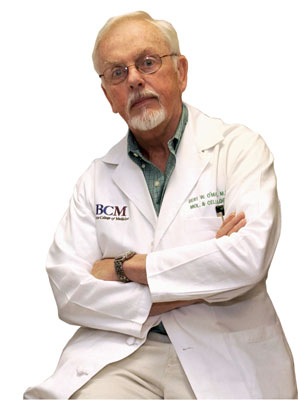Pitt Graduates 7,000 Students During 2009 Commencements
 Bert O’Malley
Bert O’MalleyUniversity of Pittsburgh Chancellor Mark A. Nordenberg welcomes graduating members of the Class of 2009, faculty, trustees, alumni, staff, and invited guests, families, and friends attending Pitt’s 2009 Commencement at 1 p.m. today.
University of Pittsburgh alumnus Bert W. O’Malley, a pioneering researcher in the field of biological sciences who earned his Bachelor of Science and Doctor of Medicine degrees at Pitt, will deliver the University’s 2009 commencement address. At the ceremony, Pitt will confer upon O’Malley the Doctor of Science Honoris Causa degree.
Chief University Marshal John J. Baker will open the ceremony, leading a procession of faculty, staff, the Council of Deans, trustees, administrative officers, and graduating class members in full academic regalia; Baker is an associate professor of oral biology in the School of Dental Medicine and president of the University Senate. The University Symphonic Band, under the direction of Pitt Director of Bands Jack R. Anderson, will provide music.
After the awarding of diplomas by Nordenberg, Pitt Provost and Senior Vice Chancellor James V. Maher, and the deans of the schools and colleges, Joseph L.
Abbott III will speak on behalf of the graduating class. Abbott, a graduating senior in the College of Business Administration, will receive the Bachelor of Science degree during the commencement ceremony. His talk will be followed by an address from
F. James McCarl III (CGS ‘73), president of the University of Pittsburgh Alumni Association, who will welcome the graduates as Pitt’s newest alumni.
In all, Pitt is conferring approximately 6,000 undergraduate, graduate, and professional degrees this year to students on the Pittsburgh campus and approximately 1,000 undergraduate degrees to students on the Bradford, Greensburg, Johnstown, and Titusville campuses, which hold their own commencement ceremonies.
O’Malley holds the Thomas C. Thompson Chair in Cell Biology and chair of the Department of Molecular and Cellular Biology at the Baylor College of Medicine (BCM) in Houston. He also directs BCM’s Center for Reproductive Biology and is associate director for basic science in the school’s Dan L. Duncan Cancer Center.
He is highly esteemed in the fields of endocrinology, reproduction, genetic disease, and endocrine cancers.
Often referred to as the “father of molecular endocrinology,” O’Malley is credited with pathbreaking insights into the function of hormones in normal development and disease states. His lab discoveries are now being applied clinically to understand fertility regulation and reproductive tissue differentiation, as well as predispositions to reproductive cancers. He also initiated what is now called “team science” and has trained more than 250 students and postdoctoral fellows in his lab.
At a White House ceremony on Sept. 29, 2008, O’Malley received the 2007 National Medal of Science from former President George W. Bush. Administered by the National Science Foundation, the medal is the nation’s highest honor for science and engineering.
O’Malley has served as president of the Endocrine Society and was instrumental in establishing the journal Molecular Endocrinology, one of the most-cited peer-reviewed biomedical science journals. O’Malley has written more than 600 scientific and medical publications and holds 19 patents for special techniques and inventions related to molecular and cellular biology.
Pitt has honored O’Malley with the Dickson Prize in Medicine, the Philip S. Hench Distinguished Alumnus Award, and the Bicentennial Medallion of Distinction. O’Malley has received numerous additional honors, including the Academia Nazionale dei Lincei Antonio Feltrinelli International Prize for Biology and the Brinker International Award for Breast Cancer Research. He also was elected to the U.S. National Academy of Sciences and the Royal Academy of Medicine in Ireland.
Other Stories From This Issue
On the Freedom Road

Follow a group of Pitt students on the Returning to the Roots of Civil Rights bus tour, a nine-day, 2,300-mile journey crisscrossing five states.
Day 1: The Awakening
Day 2: Deep Impressions
Day 3: Music, Montgomery, and More
Day 4: Looking Back, Looking Forward
Day 5: Learning to Remember
Day 6: The Mountaintop
Day 7: Slavery and Beyond
Day 8: Lessons to Bring Home
Day 9: Final Lessons

